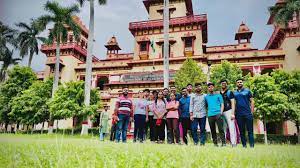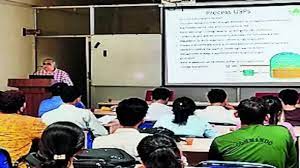IIT-BHU students introduced to real-world industry practices
Kenfra Research2023-10-11T14:07:05+05:30IIT-BHU students introduced to real-world industry practices
IIT-BHU, or the Indian Institute of Technology (IIT) – Banaras Hindu University, is a prestigious educational institution located in Varanasi, Uttar Pradesh, India. It was formerly known as the Banaras Engineering College before being integrated into the IIT system in 2012. Here’s some key information about IIT-BHU:
History: The institute’s roots can be traced back to 1919 when it was established as the Banaras Engineering College. It became the Institute of Technology, Banaras Hindu University (IT-BHU) in 1968. In 2012, it was officially designated as an IIT, making it one of the premier engineering institutions in India.
Academic Programs: IIT-BHU offers undergraduate, postgraduate, and doctoral programs in various fields of engineering, technology, science, and management. It covers a wide range of disciplines, including computer science, electrical engineering, mechanical engineering, chemistry, physics, and more.
Campus: The institute’s campus is located in Varanasi, one of the oldest and holiest cities in India. The campus is known for its scenic beauty, historical significance, and state-of-the-art facilities. It provides an inspiring environment for academic and research activities.
Research and Innovation: IIT-BHU has a strong emphasis on research and innovation. Faculty and students engage in cutting-edge research in various domains, contributing to scientific advancements and technological innovations.

5. Notable Alumni: IIT-BHU has produced numerous successful professionals and entrepreneurs who have made significant contributions to various industries, both in India and internationally.
6. Collaborations: The institute has collaborations with several other academic and research institutions, as well as industry partners. These collaborations facilitate research projects, internships, and other academic initiatives.
7. Cultural and Extracurricular Activities: IIT-BHU hosts a variety of cultural and extracurricular activities, including technical festivals, sports events, and cultural festivals. These events provide students with a well-rounded education and an opportunity to showcase their talents and interests.
8. Competitive Admissions: Admission to IIT-BHU, like other IITs, is highly competitive. Prospective students must qualify through the Joint Entrance Examination (JEE) for undergraduate programs, the Graduate Aptitude Test in Engineering (GATE) for postgraduate programs, and other national-level examinations.
IIT-BHU students introduced to real-world industry practices
IIT-BHU students have been introduced to real-world industry practices as part of an effort to enhance their education and prepare them for the challenges of the professional world. This initiative is a testament to the evolving nature of education and the importance of bridging the gap between academia and industry. Here’s an elaboration of this concept:
Practical Application of Knowledge: IIT-BHU’s focus on introducing students to real-world industry practices underscores the importance of practical application. It allows students to go beyond theoretical understanding and gain hands-on experience, which is crucial for comprehending complex concepts and their practical implications.
Industry Partnerships: Collaborations with industry partners, whether through internships, workshops, or industry-sponsored projects, enable students to work on real industry problems. This not only enriches their learning but also facilitates potential job opportunities and networks in their chosen fields.
Exposure to Cutting-edge Technologies: By participating in industry projects, students often get early exposure to the latest technologies, trends, and best practices. This can be highly advantageous for students seeking to stay updated with the rapidly evolving tech landscape.
Skill Development: Industry exposure goes beyond technical knowledge. It also helps students develop essential soft skills such as teamwork, communication, problem-solving, and adaptability. These skills are invaluable for a successful career in any field.

5. Increased Employability: Graduates who have practical experience with industry practices tend to be more employable. Employers often look for candidates who can seamlessly transition from the academic environment to the workplace, and industry exposure provides this advantage.
6. Innovation and Research: Many real-world industry projects are at the cutting edge of research and innovation. Students who work on such projects have the opportunity to contribute to new developments and gain recognition for their work.
7. Career Clarity: Exposure to industry practices can help students clarify their career goals and preferences. It allows them to explore various career options within their field of study and make informed decisions about their future.
8. Networking Opportunities: Interactions with professionals and industry experts can lead to valuable networking opportunities, which may open doors for internships, job offers, or even collaboration on research projects.
IIT-BHU students to real-world industry practices is a forward-thinking approach that benefits both students and the industries they engage with. It aligns education with the demands of the job market and equips students with the skills and knowledge needed for a successful transition into their chosen careers.







Leave a Reply